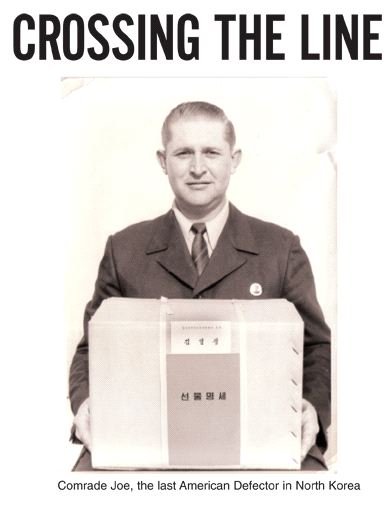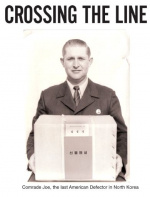Crossing the Line
Crossing the Line
This is the story of the last American defector in North Korea, James Joseph Dresnok. It's a story of defection, kidnap, love, and political intrigue, all set and captured in the most secret and inaccessible country on earth: North Korea.
In the 1960s, at the height of the Cold War, four US soldiers defected to North Korea. None of the men had any idea what awaited them on the other side. No one knows why they defected, until now. Each man left his Southern border post in the demilitarized zone - the DMZ, a 2.5 mile wide patch of land that splits the Korean peninsula in half and is the most heavily fortified area on earth, packed with 2.5m land mines-and walked into an alien world. Dresnok and his unique band of brothers published propaganda pamphlets, telling the world how happy they were in 'the People's Paradise' and starred in propaganda films, vilifying US servicemen. They became North Korean national heroes.
The world knows of only one of these men: Charles Robert Jenkins. His story broke open in September 2002 when it was reported that one of the kidnapped Japanese nationals, Hitomi Soga, had married an American defector. What no one knew at that time, except for the filmmakers, was that a second American defector, James Joseph Dresnok, was alive. Jenkins now lives in Japan with his wife and daughters. He is a key part of the story but as much of it is now in the public domain, it is Dresnok who is the driving force of the film. Dresnok remains in North Korea and lives with his family in the capital city, Pyongyang, and has not had contact with outsiders since his defection in 1962. Dresnok grew up a poor orphan in Virginia, and never finished high school. He had little choice but go to the army when after a first stint in West Germany, he was sent over to the most dangerous border in the world, the DMZ. Dresnok has now lived for 44 years in Pyongyang, capital city of North Korea, one of the most deeply anti-American societies in the world. He worked for the Korean People's Army as an English teacher, learned the language and the system. For the first time, Dresnok tells his story. In making the film, the filmmakers had astonishing access to Dresnok, his daily life in North Korea, his and the other defector families, and even the North Korean soldier who captured him in 1962. These sights have never been seen before to anyone outside North Korea, and even to most North Koreans.
“[The] compelling story and the plentiful high-definition video images of North Korean daily life prove so fascinating that Crossing the Line is riveting.” (Matt Zoller Seitz, New York Times)
“Absolutely fascinating. (Elizabeth Kerr, Hollywood Reporter)
“Fascinating.” (V.A. Musetto, New York Post)
“Film's rarity value and still-hot subject matter make this required viewing.” (Derek Elley, Variety)
In the 1960s, at the height of the Cold War, four US soldiers defected to North Korea. None of the men had any idea what awaited them on the other side. No one knows why they defected, until now. Each man left his Southern border post in the demilitarized zone - the DMZ, a 2.5 mile wide patch of land that splits the Korean peninsula in half and is the most heavily fortified area on earth, packed with 2.5m land mines-and walked into an alien world. Dresnok and his unique band of brothers published propaganda pamphlets, telling the world how happy they were in 'the People's Paradise' and starred in propaganda films, vilifying US servicemen. They became North Korean national heroes.
The world knows of only one of these men: Charles Robert Jenkins. His story broke open in September 2002 when it was reported that one of the kidnapped Japanese nationals, Hitomi Soga, had married an American defector. What no one knew at that time, except for the filmmakers, was that a second American defector, James Joseph Dresnok, was alive. Jenkins now lives in Japan with his wife and daughters. He is a key part of the story but as much of it is now in the public domain, it is Dresnok who is the driving force of the film. Dresnok remains in North Korea and lives with his family in the capital city, Pyongyang, and has not had contact with outsiders since his defection in 1962. Dresnok grew up a poor orphan in Virginia, and never finished high school. He had little choice but go to the army when after a first stint in West Germany, he was sent over to the most dangerous border in the world, the DMZ. Dresnok has now lived for 44 years in Pyongyang, capital city of North Korea, one of the most deeply anti-American societies in the world. He worked for the Korean People's Army as an English teacher, learned the language and the system. For the first time, Dresnok tells his story. In making the film, the filmmakers had astonishing access to Dresnok, his daily life in North Korea, his and the other defector families, and even the North Korean soldier who captured him in 1962. These sights have never been seen before to anyone outside North Korea, and even to most North Koreans.
“[The] compelling story and the plentiful high-definition video images of North Korean daily life prove so fascinating that Crossing the Line is riveting.” (Matt Zoller Seitz, New York Times)
“Absolutely fascinating. (Elizabeth Kerr, Hollywood Reporter)
“Fascinating.” (V.A. Musetto, New York Post)
“Film's rarity value and still-hot subject matter make this required viewing.” (Derek Elley, Variety)
Genre
Documentary
Runtime
95
Language
English
Director
Dan Gordon
Played at
Lumiere Music Hall 10.12.07 - 10.18.07
Crossing the Line Get Tickets
There are currently no showtimes for this film. Please check back soon.

